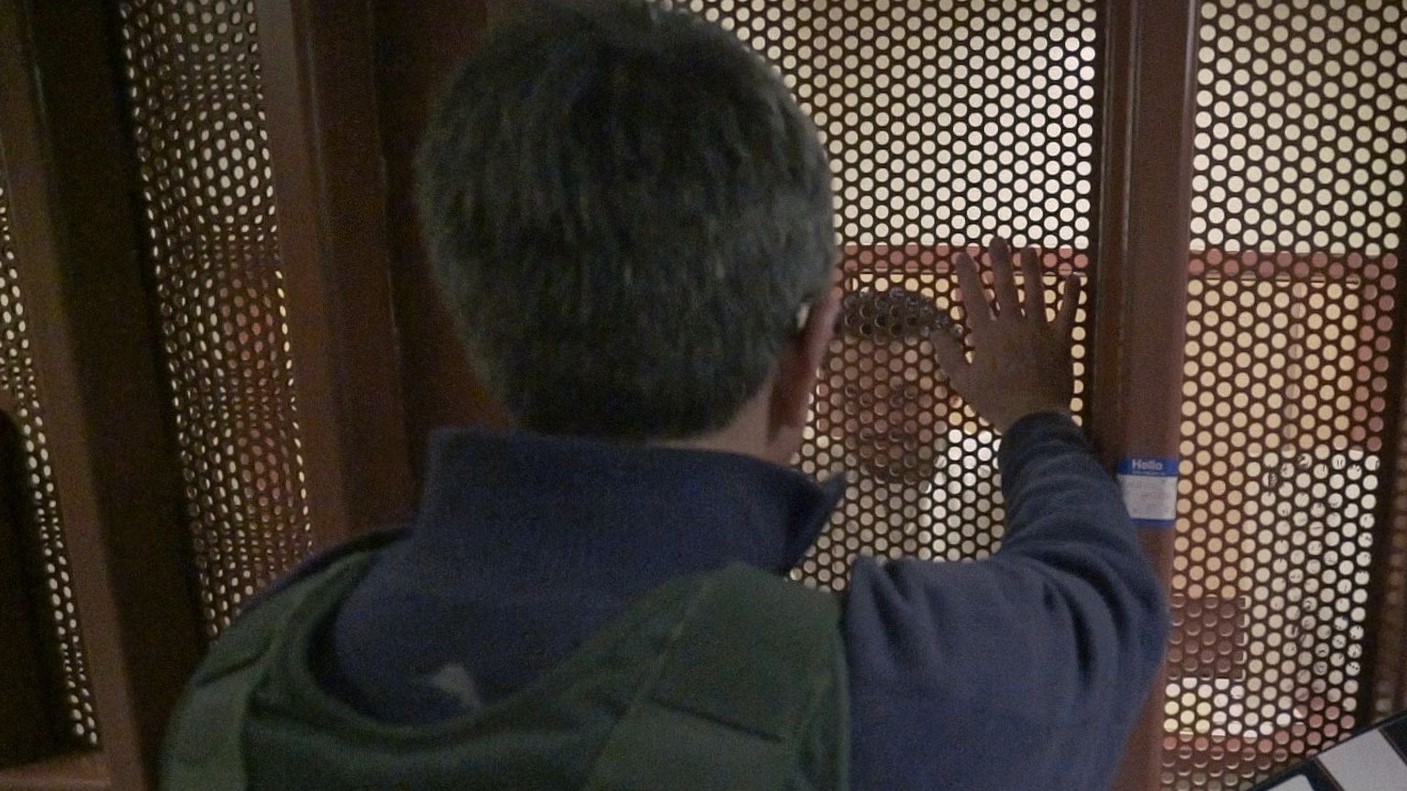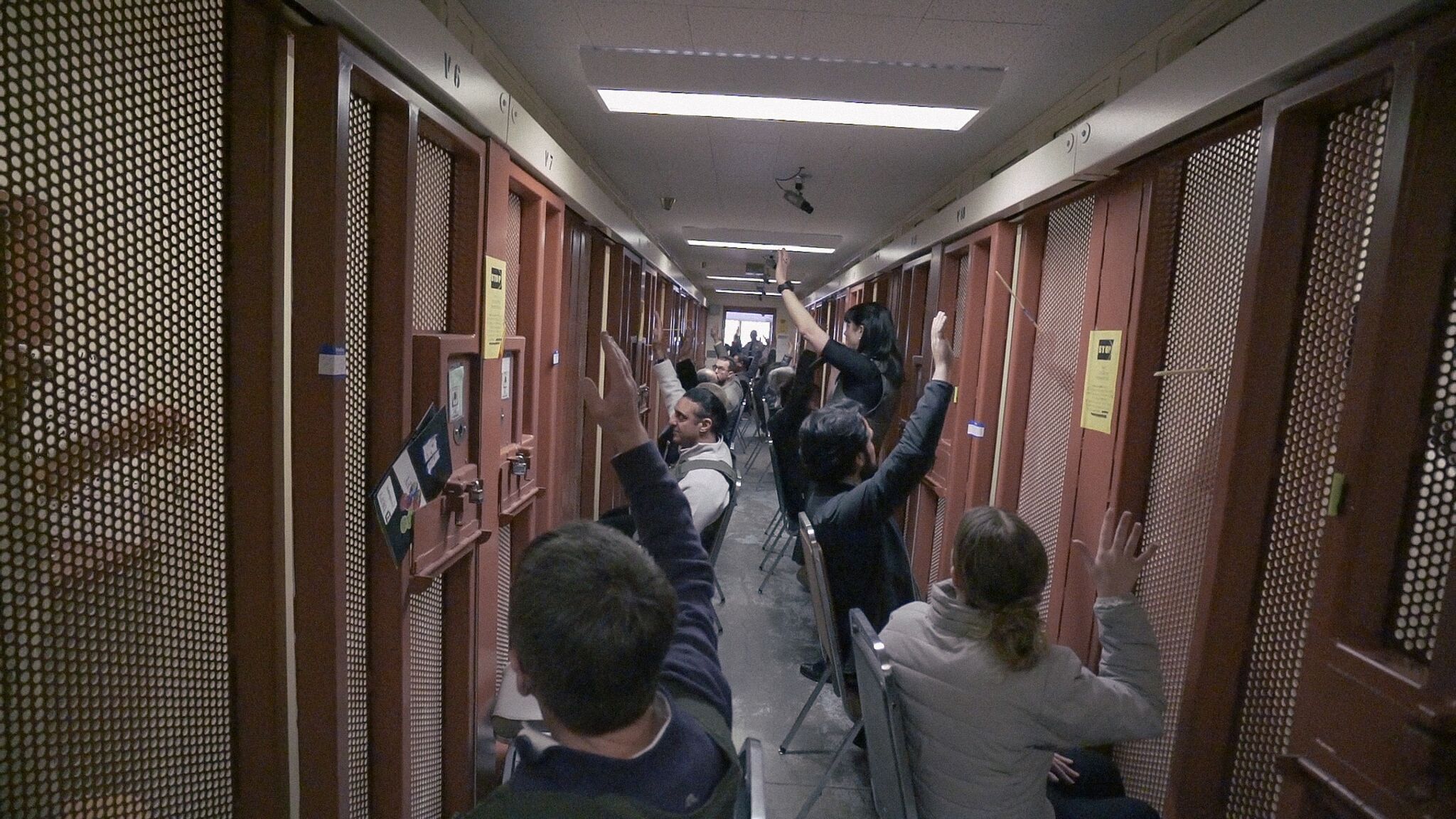
Pelican Bay Supermax Prison. I’m locking eyes with Gary, separated by a perforated metal screen as zero physical contact is permitted with residents of the Secure Housing Unit (SHU), the prison’s solitary confinement facility.
While I’m aware Gary has been “inside” for more than 15 years, I’ve no inclination to ask about his reasons for being here.
Instead, we’re focused on an exchange guided by Defy Ventures CEO Catherine Hoke as I’m part of a team of 20 volunteers who are all facing individual SHU residents and now engaged in a series of interactions advancing each resident’s ambition to change their life by taking advantage of Defy’s highly refined program featuring guided personal development with many check points for accountability along the way.
The warden tells us it is the first time a group exercise has ever been done at Pelican Bay SHU, as no organization has ever ventured in with a track record to suggest having an impact on this segment of residents who are as isolated from society as you could possibly find.
Defy Ventures is a seven year old non-profit committed to reducing America’s recidivism rate. More than two-thirds of those released from prison, returned to incarceration within 5 years.
This mind blowing rate of returning people to prison is just one of the forces propelling the U.S. to hold 25% of the total prison population of the planet, even though we have less than 5% of the global population.
While other forces like lack of opportunity in disadvantaged areas, broken families, substance abuse, underperforming public education, electoral politics and inherent bias in the criminal justice system all have layers of contributing factors that go beyond the scope of this post, no one would disagree that a primary goal of our prison system should be to rehabilitate the incarcerated so those released can be productive in society and break the cycle of criminal behavior that too often continues into succeeding generations.
Not surprisingly, as employers are reticent to hire released felons, a parolees’ lack of opportunity to progress in society erodes hope and triggers gravitational pull back to the relationships and environment, which too often leads to a subsequent criminal act.
Defy’s approach to addressing this seemingly unsolvable problem is to help both prison inmates and recently paroled join on a committed path as Entrepreneurs-In-Training (EITs) – enabled by a combination of tightly structured self development and hands on help from a cast of highly accomplished volunteers.
The results of this program are nothing short of astounding. Of the 2,000 Defy graduates, 166 businesses have been created, spawning 350 new jobs for people with criminal histories.
Defy has had only 3.2% of their graduates return to prison. When you consider the cost of incarceration in California is $70,202 per year per inmate and an investment in an in-prison Defy EIT is $500, that results in a 294x SROI for California’s taxpayers.
But the win is far more than dollars saved as the real victory is putting individual lives on a productive path, breaking a cycle of returning to criminal behavior and bringing positive effect on lives surrounding the EIT like their family, friends and others seeking to break away from criminal behavior.
Everyone Invited, Only the Committed Advance
Being an entrepreneur is an alluring path for many, especially people with a limited range of options available to them. But only the committed will thrive as the failure rate for small business is often cited at 80% within the first five years.
Defy has evolved their entrepreneur development program so that it combines online and in-person exercises requiring an EIT’s sustained commitment to advance towards graduation.
Parolees access Defy’s online learning modules over the web and because, inside prison this is typically not an option, Defy’s video based learning can be accessed on the prison’s TV network.
At each phase of development, EITs are given assessment exercises that are tracked for completion through Defy’s Learning Management System.
In both “inside” programs and those on parole, EITs form support groups where they are helping each other stay on track, forming relationships with those who share a common ambition of finding success through entrepreneurship and strengthening commitment to avoid returning to a criminal life.
Mutual Respect Begins With Shared Understanding
As EITs progress in their development, they are offered opportunities to participate in high impact personal interactions with a very impressive group of experienced entrepreneurs, executives and investor volunteers.
Through a series of interactive exercises, volunteers and EITs come to know each other and learn about each other’s lives in ways that highlight their differences and similarities. In one exercise, separate lines of volunteers and EITs face each other, then step to a center line acknowledging how environment, family and impact of selected circumstances played out with either fortuitous or unfortunate outcomes now determining their status as an EIT or professional volunteer.
It is the similarities more so than the differences that are striking for me.
Like most volunteers, it is a huge “aha” moment to wrap my head around the realization that, with just a minor twist in my own life circumstances, it could easily have been me standing in the EIT line or see EITs with the clear potential to have ended up on the volunteer line as successful professionals.
That shared understanding of each other’s position begins the process of building mutual respect that in turn powers advancement of both EITs and volunteers in our respective journeys.
For in-prison events, volunteers provide coaching to EITs on topics that include articulating their personal elevator pitch, resume feedback, mentoring on the business idea the EIT is developing and participating in pitch competitions.
Volunteer support for those who are released include those activities as well as supporting and tracking an EIT’s progress and linking EITs to resources that can help their business succeed.
In all situations, EIT contact with volunteers follows a strict protocol managed by Defy in a way that preserves privacy and security considerations.
A Different Kind of Volunteer Impact
Since I was already deeply engaged in helping lots of first time entrepreneurs, the fit for me to check out Defy was pretty easy. While the audience was different than the startup world I am typically engaged in, the activities seemed right within my wheelhouse.
My expectation before volunteering was that my ability to have impact would be based on my knowledge, entrepreneurial experience and relationships I could bring to the program.
But beginning with my first event, the nature of my interactions with EITs were in such sharp contrast with the traditional world of helping startups I began to understand this was less about my professional qualifications than it was an opportunity to grow by being vulnerable and giving without expectation of return.
You see in the traditional startup-coaching scenario we don’t spend much time showing personal vulnerability. We go right to diving in with the help and expertise we think we’re there to give.
And even if we tell ourselves we have a “pay it forward” mindset, we know the startup world has so many interconnected relationships there are paths where our volunteer contributions may come back in some form of unexpected reciprocity – be it new deal flow, a helpful entrepreneur or investor contact, or referral to a highly valued source that can help us.

Defy Interactions Can Be Transformational
The Defy personal interactions are humbling in their effect of acknowledging vulnerability and rethinking about forces that led to how I arrived at the stage of my life where I can qualify as a Defy volunteer.
And when there is zero expectation of reciprocity, it forces the commitment choice on what my real reason for volunteering is – am I sincere enough in my values to walk the talk of pay it forward, or not?
Locking eyes with Gary and continuing our discussion through the perforated metal screen brought home that realization on how any impact I was having wasn’t about my professional experience, but instead my ability to show understanding, compassion and commitment to someone otherwise cut off from society.
I’m thinking that after our exercise concluded, Gary replayed the interaction in his mind as many times as I have. For different reasons, perhaps we both came away feeling we grew as a result.
So my own success measure for Defy volunteer participation is now flipped from where I was at the outset.
These powerful in-person interactions have done much to alter my personal outlook in a transformational way – something that I simply don’t get in the traditional role of mentoring startups headed by people that have already been dealt a pretty good hand.
But that benefit of a transformational outlook comes only as a result of participating with Defy in person.
It’s alluring enough to keep me coming back for more, and is probably the underlying force behind Defy’s high rate of returning volunteers – which is the only kind recidivism you really want to see!
This sounds like an awesome program, Martin. Knowing you, I can’t say I’m surprised to find you involved in it. Fascinating post.
Thanks Bo – seeing Defy scale up from a local vision to one of nationwide impact is also inspiring. I’ve been involved for 2 years and learning a lot along the way. California and New York State have the largest number of Defy opportunities today but the roll out plan is impressive and already has garnered more than 2500 volunteers!